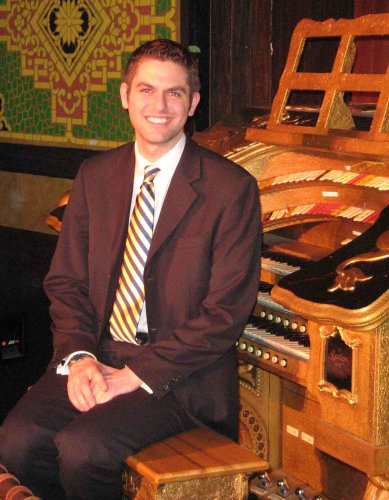Jul 24, 2012
DePaul Alum Named ‘Organist of the Year’
DePaul Alum Named ‘Organist of the Year’
Mark Herman, an alumnus of The Theatre School at DePaul, was presented with the prestigious “Organist of the Year” 2012 award from the American Theatre Organ Society. The award is presented to one organist each year to recognize outstanding achievement in the field of performance on the theatre pipe organ.
“It was really a surprise because the award usually goes to people who have been playing the organ for an entire career,” says the 24-year-old Herman, the youngest organist to ever receive the award. “The biggest honor is joining the list of past honorees–most of the greatest theatre organists of all time. I’m thrilled to receive this award.”
Herman has performed concerts around the world since age 18 and has released two recordings. He kept a busy touring schedule throughout his undergraduate career at DePaul and, after graduation, continues to balance touring with his career as the sales director at the Phoenix Theatre of Indianapolis.
“Balancing school and performing was difficult at times,” he says. “If you ask any of my professors, they all knew that I was skipping town on weekends to go to Oregon or California or New York–wherever it may be– to do a concert. In my current job, a great thing about working at a theatre is that I get to work with other artists, and artists understand artists. It works out well because they allow me to adjust my schedule to accommodate concerts that I do, as long as the work gets done.”
Tool of the trade
Herman learned to play the piano by ear at the age of 4 and started formal piano lessons at 7. When he heard a pipe organ played at a cousin’s wedding, Herman was smitten. “I saw that the organ had more keyboards, more buttons and a bigger sound than a piano. This made it obvious to me that the pipe organ simply had to be even more fun than the piano.”
The theatre organ was developed in the 1920s and was specifically designed to accompany the silent films of the era. It was cheaper and more effective to pay one organist to provide the soundtrack to a film than to pay an entire orchestra. Theatre organs have up to five keyboards, another keyboard played by the feet and hundreds of controls and programmable buttons to emit pipes, percussions and sound effects.
“They wanted organs to sound more like a real symphony orchestra or a marching band or a jazz band,” Herman says. “Because of that, you are able to play almost any kind of music on them– from orchestral suites to big band and Broadway songs.”
Herman expects to release a new recording this year and still hopes to play one day at Radio City Music Hall in New York.
“They have one of the largest Wurlitzer theatre organs that the company ever built,” he says. “Although it’s not in very good shape, from what I understand, I would still relish the thrill of playing in that kind of space. I also hope to play more concerts and build a career around theatre organ as well as theatre management, which is what I trained for at DePaul.”

Mark Herman
